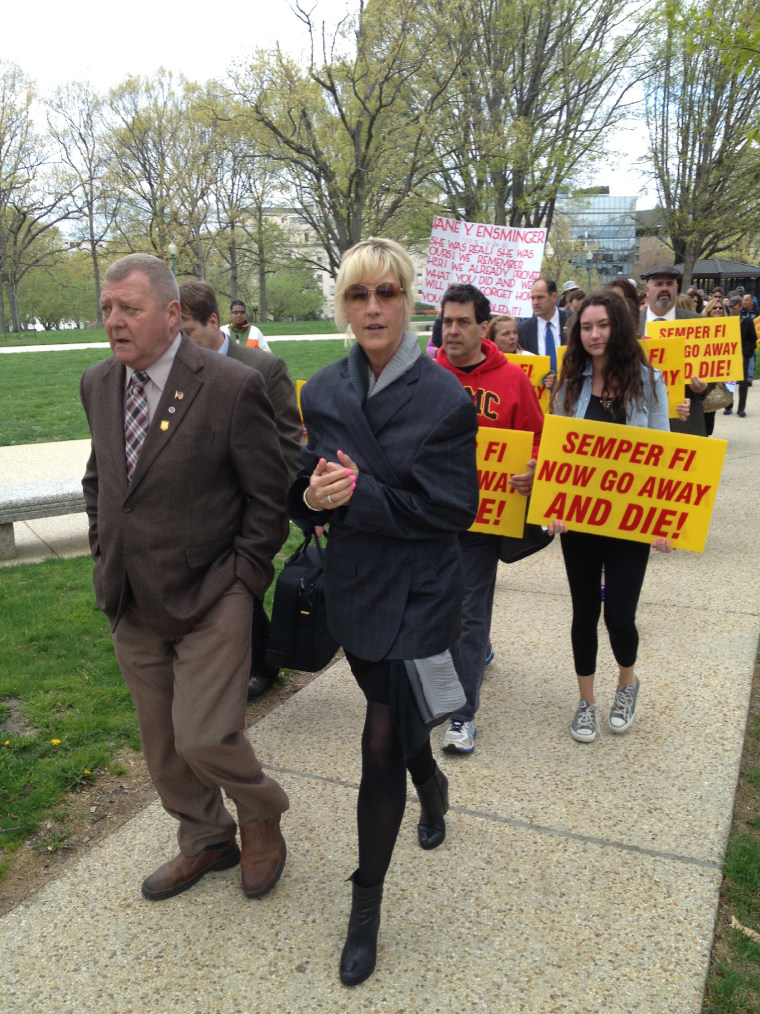“Pollution is silent, corporations are deceptive,” explained Erin Brockovich in our follow-up conversation to Monday’s interview on Ronan Farrow Daily regarding the decades-old problem of water contamination at Camp Lejeune in North Carolina. Brockovich has spent the week in Washington demonstrating her passionate commitment to finding answers for the troops and families living around the large Marine base in Jacksonville, NC. She rallied outside the court while justices heard arguments in CTS v. Waldburger and then sat in court for the first time to listen in.
In 2009, plaintiffs, including Peter Waldburger, discovered that their well water contained chemicals similar to the ones stored by CTS Corporation, which had owned the land 20 years prior. Marines, their families and workers at nearby Camp Lejeune had also ingested that same polluted water for decades, and they maintain that their exposure led to fatal illnesses including leukemia and cancer. Waldburger and two dozen landowners first sued CTS Corp in 2011 and the Supreme Court granted review of the case January 10, 2014. Meanwhile, the Department of Justice has taken the side of CTS Corp by filing a brief on their behalf.
We spoke with Brockovich after she left the Supreme Court on Wednesday. She was pleasantly surprised by the vigorous debate between justices; none of them, she said, had heard mention of this catastrophe for the past 20 years. Describing the justices as “animated and inquisitive and thought-provoking with a little bit of humor,” she sensed genuine interest in the case – which was immensely gratifying for Brockovich, whose core mission is to raise awareness.
But the long-time activist cautioned that the positive energy doesn’t automatically translate into victory. The arguments may be captivating, but “these returning vets from Camp Lejeune and their families are concerned that they’ve been somewhat deceived by the government” because of the Department of Justice decision to side with CTS. “I mean, my children serve and they truly believe the values that they’re taught and they fight for this nation and to come home and to have a deception by your own government – your families have been poisoned – is kind of a tough pill to swallow,” she lamented. Brockovich predicted that the Supreme Court will have a difficult time, and will “sit on eggshells until a decision is made,” which will be in June.
She cited the overall lack of transparency regarding environmental risks as the heart of the problem, and reminded that “pollution is not isolated to North Carolina”; the Camp Lejeune disaster is only one instance that has been played out numerous times across the country. “Pollution is the nation’s problem,” Brockovich stated, and worried that its silent nature allows people to act irresponsibly without considering the consequences. “Sometimes,” she said, “we have no idea of the enemy lurking underneath our feet.”
Brockovich also reflected on the bigger picture, recommending that companies start by “standing up” and holding themselves responsible for the long-term interests of our environment and our citizens. She joked that “sometimes, I feel like I’m talking to my teenager – clean up your room!”
She hopes that the process of raising awareness won’t always require a “legal battle”; instead, she looks for a much more fluid national dialogue between consumers, corporations, and governmental entities about mistakes that have been made thus far and ways to prevent them going forward. Much of the challenge, she feels, is about reshaping corporate mentality as well as the civilian perception of environmental responsibility.
She was particularly emphatic about harnessing social media as a platform for dialogue, pointing to its ability to uncover information and form new communities around shared experiences. So far, her advocacy work has revolved around “campaigns, better communication, and the idea that it doesn’t have to be one way or the highway.” But for the first time, Brockovich said, thanks to social media, more and more people are hearing these stories and engaging with the issue – which in turn, she hopes, will allow her to focus on developing the next creative chapter in her advocacy.
In the end, Brockovich was clear about her overall conclusion: corporate environmental responsibility is “a common sense thing.” She’s optimistic that once companies “bridge the gap of trust” with surrounding communities, those who live there “will always be willing to work with them.” Until then, she eagerly awaits the Supreme Court’s decision on CTS v. Waldburger.
Oh, and you can find her on Twitter.
